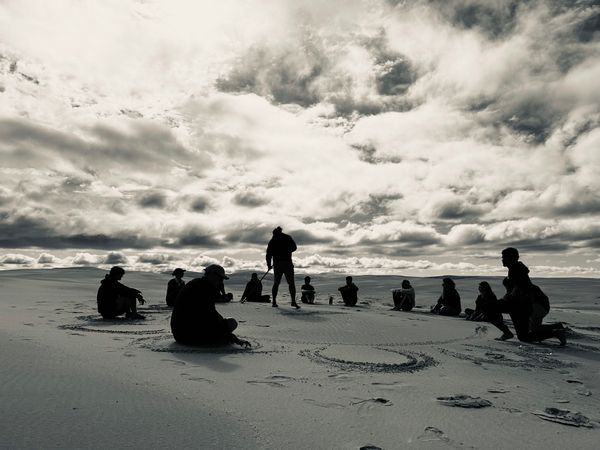Myall Creek Massacre remembered
By Ankith Atluri, Year 10
Love or hate, equality or prejudice, reconciliation or destruction. No matter what occurs in life, every decision is split dichotomously into two choices: good or bad. How we make these decisions affects the attitude of society. Do we want a society filled with greatness or despair? This was the message that nine Year 10 students absorbed during the trailblazing 2024 Myall Creek Massacre Commemoration Trip.
Day 1 was the introduction to our journey, and we made our way to Newcastle’s Glenrock State Conservation Area. There we met Amos who gave us insight into the indigenous way of life in the area. We were introduced to a variety of plants that are used as perfume and soap and on our journey towards the lagoon, he regaled us with stories and music to enrich our experience of learning about the Awabakal and Worimi peoples.
Day 2 got off to a great start as the group sat in awe of the mesmerising sunrise across Stockton Beach. We then travelled to Birubi Beach and met Peter and Antoine who took us out to explore the area. They presented the clever way First Nations Peoples inhabited Australia. For example, we learnt how we could easily find fresh water on the beach. But the most important messages that Peter shared with us is how First Nations People connect with the environment. Land is seen as sacred, to such an extent that it is referred to as "mother". Mother provides a plethora of resources that are crucial to survival and thus it is our responsibility to take care of land as if it is our mother. However, this is not the happy reality of Australia. At numerous cultural sites, we saw tyre marks through them and piles of rubbish. This highlights the careless attitude of our society towards the environment. After the workshop, went to the high sand dunes where we had a terrific time and conquered our fear of heights. After running up the dunes so much that our calves felt like jelly and having so much sand on us that we felt like sandpaper, we drove away and headed towards Nundle.
Day 3 started with a meeting with Len Waters, a Kamilaroi man, who told us about stories and culture. He told a story about how humans caught a big fish and how all the fish we have today come from humans cutting up parts of that large fish and throwing it in the water. Len also talked about how a crocodile burrowed through the land and created rivers and valleys. After he told us these stories, he helped us make hand paintings out of ochre and water. He then took us to visit Boundary Rock at Moonbi. The rock art shows the meeting place between the elders of the Anaiwan and Gomeroi tribes, and how boys become men in Aboriginal culture. The painting is at least 700 years old and was made by using ochre, animal fat and blood.
Day 4 – 9 June marked the day of the tragic events of the Myall Creek Massacre. We were joined by students from Queensland, ACT and local schools in the area. The first part of the commemoration included dancing by two different Gomeroi groups and guest speakers such as Boe Spearim. Afterwards we joined with other schools to tell the story of the massacre at Myall Creek. This not only informed us about the incident but led to the forming of new friendships. Then, the most important part occurred: Wirrayaraay elder, Aunty Sue Blacklock didn’t vilify the descendants of the perpetrators, but rather invited them to embrace the descendants of the victims. This was the most majestic and beautiful part of the trip and showed that despite the struggles encountered, we learn from our mistakes and unite as Australians. We still have a long way to go to right the wrongs of the past, but can create a future of peace through reconciliation.
This trip was momentous for everyone involved and we will cherish the memories for the rest if our lives. I strongly encourage future year groups to take part in this wonderful experience so that we as individuals can unite as Australians.
Haiku written by Riley Wright (Year 10):
Breathtaking nature
perfectly peach horizon
Timeless memories
